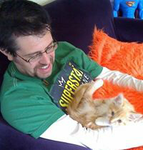A brief history of blood- (or other substances-) suckers in Doctor Who
SFX ’s irregular Vampire Specials are prioving so mindbogglingly popular we just can’t stop producing them. It’s almost like we’ve launched a new magazine on the sly. There’s a new one out on Wednesday (keep on eye on this site for details), and so to get you in the mood, here’s one of the features from the previous Vampire Special.
The Chase (1965)
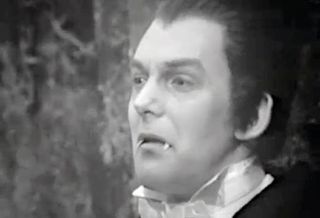
Doctor: William Hartnell
Being chased through time and space by the Daleks the original Doctor and co materialise in what appears to be a gothic castle complete with Frankenstein’s monster and a Lugosi-inspired Dracula. The Doctor speculates they have arrived somewhere that nightmares are made a reality, but in fact, unbeknownst to him, they have actually landed in a fun fair ghost house. It’s more of a rim shot than a twist.
The Claws Of Axos (1971)
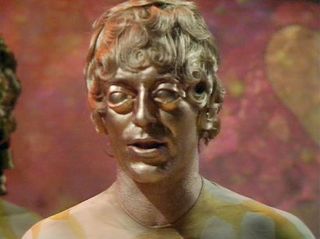
Doctor: Jon Pertwee
Originally this story was called “Vampires From Space” which was actually promising more than it delivered, so maybe the title change was a wise idea. “Groovy, Tentacles, Leotard-Lovers From Space” would have been more accurate. They suck energy rather than blood, using it to power lava lamps and oil projectors, apparently.
State Of Decay (1980)
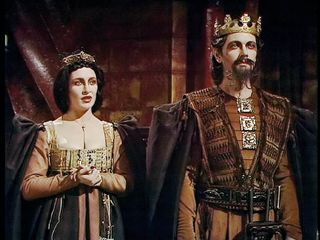
Doctor: Tom Baker
When an Earth spaceships crash lands on an alien planet, a stranded Great Vampire turns the commanding officers into immortal bloodsuckers. He also gives them a taste for gothic clothing and David Bowie make-up.
The Curse Of Fenric (1989)

Doctor: Sylvester McCoy
Warning – if we continue to pollute the Earth, in millions of years we'll all evolve into Haemovores, which are water-dwelling, blood-sucking monsters that can be killed by a stake through the heart and have an aversion to strong beliefs. The Doctor meets the Ancient Haemovore in World War Two, but it’s been hanging round since Viking Times having been brought back from the future. Well time-travelled, then.
Smith And Jones (2007)
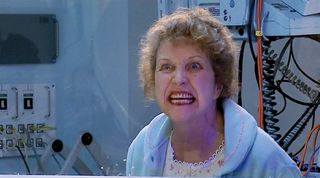
Doctor: David Tennant
From Haemovores to Plasmavores (it's all a matter of taste). The Doctor meets one of these shapeshifters when it disguises itself as an ex- Coronation Street character in an Earth hospital. Plasmavores drink blood through straws, which seems incredibly civilised of them. Saves getting blood all over your chin and dribbling onto your shirt.
Vampires Of Venice (2010)
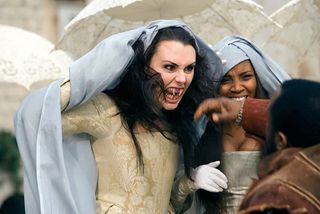
Doctor: Matt Smith
When is a vampire not a vampire? When it’s a fish with dodgy perception filter. You know, it’s amazing how much a fish with a dodgy perception filter can come off so vampiric. A dodgy perception filter can explain everything from why they have no reflection to why they have fangs and how they can transform into giant, er… fish. Maybe if it had been working properly they could have done the bat thing. This lot were actually aliens from the aquatic planet Saturnyne, who ended up in 16th century Venice after falling through some cracks in time, inveigled their way into Venetian high society and then set up a rather aggressive breeding programme. If anyone ever offers you vintage Venetian caviar, politely decline.
And on the next page, a brief interview with Terrance Dicks on the writing of “State Of Decay”…
.
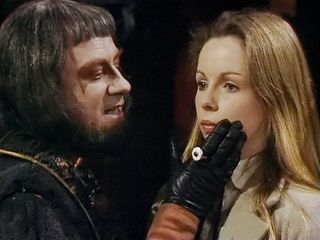
During Tom Baker’s final series of Doctor Who back in 1980, the Doctor faced some space vampires in the story “State Of Decay”. Written by former script editor Terrence Dicks, the story was based on an alien planet (actually inside another universe, known as E-space) where the cowed, peasant-like locals pay fealty to three vampire overlords. In fact, the script was even older, as Terrance Dicks himself explains…
SFX: You originally wrote the script for season 14 of Doctor Who in 1977, though it didn’t reach the sscreen for three years. Who originally had the idea of doing a vampire tale? You, or then-script editor Robert Holmes, who was famed for updating old horror tropes on the show?
Terrance Dicks: It was me. Bob would have said, “I want you to do a story for next season, come in and talk about ideas,” y’see. And at one stage I would have come up with, ‘Well what about vampires?’ because I’m quite keen on vampires.
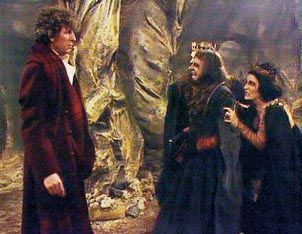
Why is that?
I don’t know. Two things really recur in my work: vampires and Nazis, though I’m not particularly in support of either, so to speak. I find them fascinating themes because of the evil. And what I like about vampires is the lore. The background. The great thing about vampires is: vampires have rules… So all that gives you a context to write your story around.
Presumably your influences must have been Hammer films?
Exactly that. Christopher Lee as Dracula. I wrote a series of children’s books called The Unexplained , a few years ago, and I’ve got a vampire story in that. They crop up now and again in my work.
At that time, the show had just gained a new producer, Graham Williams, who had been told by the bosses to tone down the horror. Did he express any worries about a potential vampire story?
No, no, no. There was no resistance. Well, not on those grounds. Where there was resistance was because the BBC was doing a prestige, classic serial version of Dracula with Sir Laurence Olivier as Van Helsing. I’d written the first couple of scripts, I think, when Bob Holmes got a directive from on high saying, “You may not do a vampire story on Doctor Who , people will think you are making fun of us.” So we had a sudden crisis and the show got temporarily cancelled.
But surely audiences wouldn’t think there was any connection?
Of course. We thought, “Silly bastards” but what your mind turns to immediately, is what are we going to do about it? And Bob eventually said, “I’ve always wanted to do a story about lighthouses,” and I said, “I don’t know anything about lighthouses,” and he said, “Buy the Boys’ Book Of Lighthouses and find out,” which is what I did. And that’s how “Horror Of Fang Rock” came about.
But then, three years later, a new production team was in place and they dusted down the old script, and got you to finish it off. How much did the original version differ from the one we saw?
Very little, except it had a different companion. Leela instead of Romana. And aren’t they in E-space at the time? I never really had any truck with that E-space nonsense and I used to ignore it. But they land on a desolate planet and discover that it’s ruled by vampires, so it’s the same tale basically.
[Christopher H] Bidmead, the script editor, and I – we didn’t get on enormously well – and, anyway, I wanted to call it “The Vampire Mutations” which is a much better title, and he said, “No, no, it will give it away that it’s a story about vampires.” I said, “Chris, from the very beginning there are sinister characters who never come out except at night and people staggering about looking drained of blood. The audience will get the idea the story’s about vampires fairly early.” And it’s an attraction. You’re waiting for them to turn up. It’s like having Daleks in the title. You don’t see Daleks immediately, but you know they’re coming. And I like to work like that. Then it was called “The Wasting” for a while. Never have a title which somebody can turn back on you as jokey criticism – you’re inviting fans to say, “This is a wasting of time.” So I dug in my heels about that. We eventually came up with “State Of Decay” – well, I think Chris did – which I didn’t much like, but I thought was acceptable.
The idea of the tower being both a spaceship and, ultimately, a giant stake was a clever idea.
No, to be fair, that was Chris. I just had them living in an old dark tower because that’s where vampires live. And he suddenly said, “Suppose the tower is actually the spaceship?” And being essentially fair-minded I said, “Yeah, that’s a great idea Chris.” It worked very well.
What did you think of the final version on screen?
It was okay. Nothing’s perfect, but I thought they did a pretty good job of it. Scriptwriting is not a job for the insensitive. If you got 80% of your script through, that’s fair enough.
